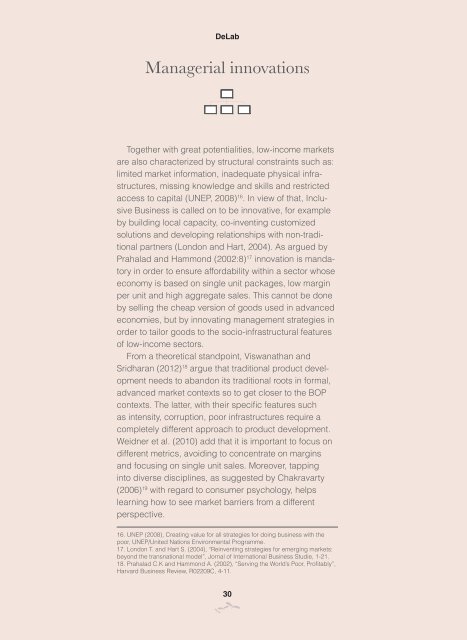INCLUSIVE BUSINESS
You also want an ePaper? Increase the reach of your titles
YUMPU automatically turns print PDFs into web optimized ePapers that Google loves.
DeLab<br />
Managerial innovations<br />
Together with great potentialities, low-income markets<br />
are also characterized by structural constraints such as:<br />
limited market information, inadequate physical infrastructures,<br />
missing knowledge and skills and restricted<br />
access to capital (UNEP, 2008) 16 . In view of that, Inclusive<br />
Business is called on to be innovative, for example<br />
by building local capacity, co-inventing customized<br />
solutions and developing relationships with non-traditional<br />
partners (London and Hart, 2004). As argued by<br />
Prahalad and Hammond (2002:8) 17 innovation is mandatory<br />
in order to ensure affordability within a sector whose<br />
economy is based on single unit packages, low margin<br />
per unit and high aggregate sales. This cannot be done<br />
by selling the cheap version of goods used in advanced<br />
economies, but by innovating management strategies in<br />
order to tailor goods to the socio-infrastructural features<br />
of low-income sectors.<br />
From a theoretical standpoint, Viswanathan and<br />
Sridharan (2012) 18 argue that traditional product development<br />
needs to abandon its traditional roots in formal,<br />
advanced market contexts so to get closer to the BOP<br />
contexts. The latter, with their specific features such<br />
as intensity, corruption, poor infrastructures require a<br />
completely different approach to product development.<br />
Weidner et al. (2010) add that it is important to focus on<br />
different metrics, avoiding to concentrate on margins<br />
and focusing on single unit sales. Moreover, tapping<br />
into diverse disciplines, as suggested by Chakravarty<br />
(2006) 19 with regard to consumer psychology, helps<br />
learning how to see market barriers from a different<br />
perspective.<br />
16. UNEP (2008), Creating value for all strategies for doing business with the<br />
poor, UNEP/United Nations Environmental Programme.<br />
17. London T. and Hart S. (2004), “Reinventing strategies for emerging markets:<br />
beyond the transnational model”, Jornal of International Business Studie, 1-21.<br />
18. Prahalad C.K and Hammond A. (2002), “Serving the World’s Poor, Profitably”,<br />
Harvard Business Review, R02209C, 4-11.<br />
30


